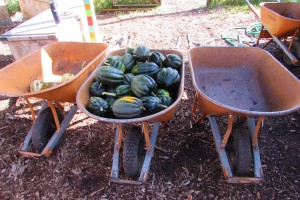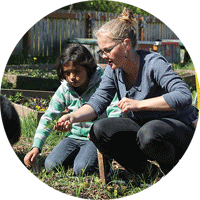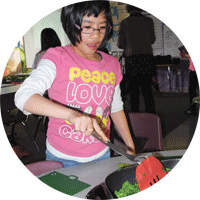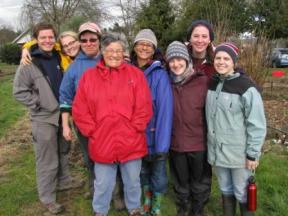
Nutrition & Garden Educator Pamela Ronson, Dani Ladyka from Apple Corps and volunteer Sarah Rehdner harvest chard at Marra Farm.
Recently, I bused to the South Park neighborhood to volunteer at Solid Ground’s Giving Garden at Marra Farm, a project run by our Lettuce Link program. Farmer Scott Behmer wasn’t surprised when I arrived late: “This is a really underserved area, regarding transportation and lots of other services. And really, that’s why we’re here.”
Scott explained that the farm has two main functions: food production and education, or in other words, “fighting the symptoms and fighting the causes.” He added, “Food banks are really important, but they won’t end hunger. Education is one of the ways we can change the system.”
I witnessed the education side of Lettuce Link’s work when a 5th grade class arrived from Salmon Bay K-8 School, an alternative public school located in Ballard. The group gathered around Scott for a brief orientation, and he explained the origins of Marra Farm: “All the land around the city used to be farmland to feed the city. This bit of land has stayed farmland.” The farm is named after the Marra family, who used to own and work the land.
He gave the students a brief intro to the food industry as well, explaining that each bite of food travels an average of 1,500 miles. “Some of it is food that we can grow here, and we still get it from far away.”
Throughout the year, the farm produces 25-30 different vegetables, which last year resulted in 15,000 pounds of food (not including another 8,000 pounds from our Seattle Community Farm in the Rainier Valley). That day the harvest included parsley, loose-leaf lettuce, chard and squash.
The produce is mostly donated to food banks in the area, as well as the South Park Senior Center and South Park Community Kitchen. Lettuce Link also offers Work Trade opportunities, where volunteers can help maintain the farm in exchange for produce.
The day I volunteered, Providence Regina House – a food and clothing bank that serves four zip codes from South Park to Des Moines – came to collect food. Jack Wagstaff, Providence Regina House Program Manager, echoed Scott, saying that their food bank is intentionally located in that area, because “it’s radically underserved by anyone else.”
Before the food bank truck arrived, the students were each able to harvest two acorn squash. “We all have times where we get to help others, and we all have times where we get to be helped by others,” Scott told them. “Today, you get to be the helpers.”
The class teacher, Nicolette Jensen, said she has brought her class to the farm for the last three years. She feels it’s important for the students to “learn about the food industry and about how food used to be in the city. I think that little bit of education goes a long way.”
After harvesting, we washed the produce and stacked it in crates, ready for pickup. As the students ate their lunch, volunteers and employees gathered under the tent; Jack from Providence Regina House shared some snacks, and a neighbor joined us from across the street. Though everyone came from different places and had different levels of experience, a sense of community and shared purpose was clear at Marra Farm.
Filed under: Lettuce Link | Tagged: community gardening, food access, Lettuce Link, Marra Farm, Seattle Community Farm | Leave a comment »














